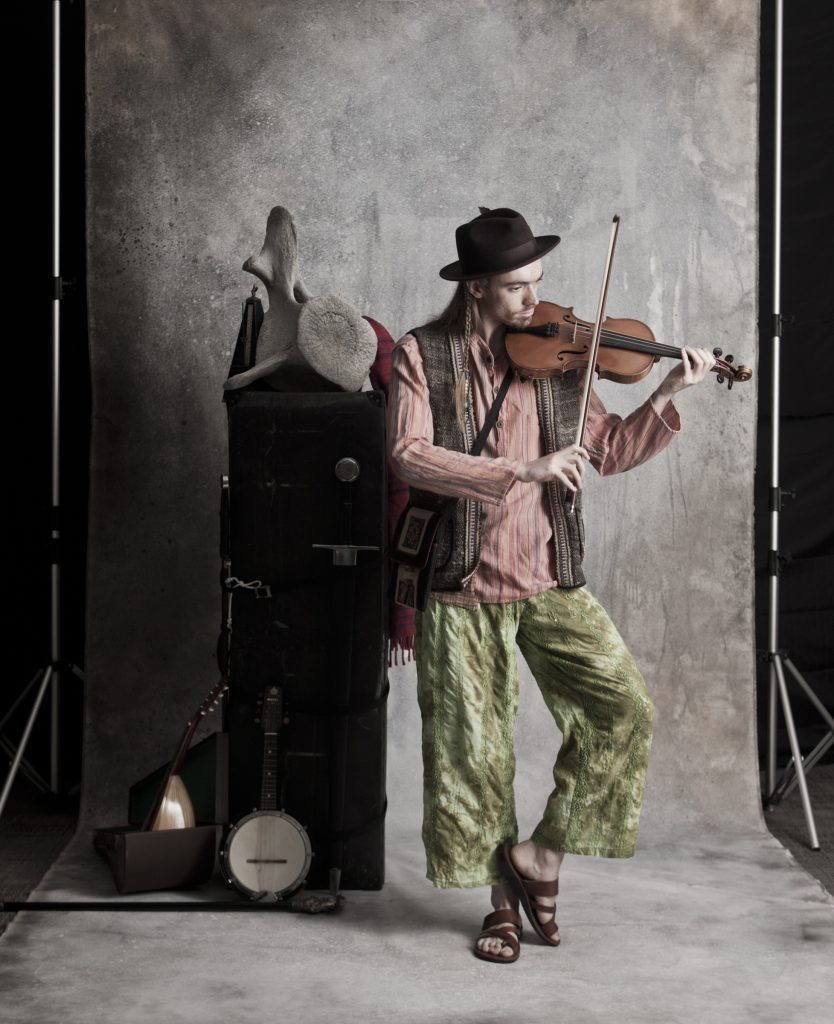
YS: If you were to choose a family object for the exhibit, which object would it be?
JSB: I’ve chosen a photo of me playing the violin that belonged to my grandpa and his twin brother. It was taken for a photoshoot at the Conservatorium of Music, University of Western Australia, while I was a student there. The photo is supposed to depict a travelling musician and features many objects that my family collected over the years, but the violin is the most important one here.
YS: Why did you choose this object? What do you associate with it?
JSB: This violin has been passed down through my family for generations. It was named Jack by one of my cousins. My great-grandfather bought it in Vienna for his sons so that they could learn to play. Neither of them were particularly good violinists, and by all accounts they rarely did their practice, but music was always important to them. This violin was one of the few things they brought with them when they came to Australia during the war. The family often frequented the concert halls of Vienna when they were children and, right until the end of their lives, both of the twins were keen patrons of the arts. My grandfather was especially fond of Bach.
I went on to study classical voice, having grown up hearing my grandpa’s music. I now work as a music researcher. I am not a particularly good violinist, but I do still play, and it always brings me joy to play this violin.
Some years ago, I was visiting Yad Vashem in Israel. Some of the rooms have glass cabinets full of objects that were recovered from concentration camps — the belongings of those who had been exterminated. One cabinet contained a violin. The image of the violin in that cabinet still haunts me. Had history gone slightly differently, it could have been Jack in there.
YS: Where did your family live before the Holocaust and where do they live nowadays?
JSB: My family’s roots are mostly around Austria, the Czech Republic and Poland. My great-grandfather moved from Cieszyn to Vienna, where he studied and later worked at the university. My grandfather was born in Vienna. In 1938, my great-grandfather lost his job at the university, and the family moved to London shortly afterwards. They were incredibly lucky that they had friends there who could take them in, and that they escaped when they did. My grandfather and his twin brother did their final year of school in London, and then moved to Australia with their sister, although my great-grandfather stayed in London throughout the war. All three went to Melbourne first, and then the twins found work in Perth, Western Australia, where their father would later join them towards the end of his life. Their sister stayed in Melbourne.
My grandfather and his siblings all had families of their own, and most of their descendants are still in Perth or Melbourne, although I do have some cousins scattered around the UK and Australia. I myself moved to Europe to study 10 years ago, and had the privilege of living in Vienna for a while, which gave me the opportunity to reconnect with my grandpa’s city, and to study at the university where my great-grandfather once taught.
YS: How does your family´s survival story and the Holocaust continue to influence you today?
JSB: The story of how our grandparents escaped from Europe is a family legend that has been passed down and still forms an important part of our family identity. It is something I share with all my cousins. It’s also something I share with many other Jewish Australians. Being from a mostly secular family, we never had a strong religious identity, but most Jews in Australia have similar stories of how their families got there. Those shared stories bind us together, but it also feels rather tragic that so much of our identity is based on the Holocaust—a thing that was done to our ancestors.
Since moving to Europe, I’ve been trying to reconnect with my heritage in a more positive way, as an active participant. It’s been a delight to visit different Jewish communities, to find that we’re still here, and to meet people who have slightly different family stories—of how their family hid during the Holocaust, or returned after the war. These interactions have been very special to me, and they give me hope that we might forge a more empowering identity that remains rooted in our shared history, but also looks towards a brighter future for Jewish life in Europe.
